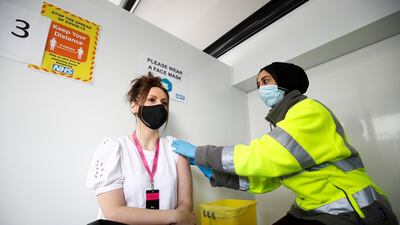Vaccine sharing and reduced trade barriers are vital if the target to inoculate 40 per cent of the world's population can be achieved by the end of 2021, global health leaders say.
The heads of the World Health Organisation, International Monetary Fund, World Bank Group and World Trade Organisation said the lack of vaccines in developing nations makes it easier for new variants of the virus to take hold.
They said the shortfall was creating a “two-track” pandemic, with low-income nations receiving “less than 1 per cent of vaccines administered so far”.
The leaders spoke during a press conference at the WHO on Tuesday as they announced new funding efforts to tackle vaccine inequality around the world.
WHO Director General Tedros Adhanom Ghebreyesus said the funding would "dramatically scale out the production of diagnostics treatments, oxygen, medical equipment and vaccines for equitable distribution."
The attendees – including IMF chief Kristalina Georgieva and WTO Director General Ngozi Okonjo-Iweala – confirmed there would be $50 billion (£35bn) in new grants to help developing countries with their vaccination campaigns.
They suggested a target of vaccinating 40 per cent of the world’s population by the end of this year, rising to 60 per cent by the first half of next year.
They also called for an immediate commitment to send doses abroad, as well as investment in vaccine production to produce an extra 1 billion doses, along with seamless global trade to allow vital vaccine ingredients to cross borders.
The World Bank now has $12 billion in Covid-19 vaccine financing available and will have approved vaccination financing operations in over 50 countries by the end of June, the development lender's president, David Malpass, said at the conference.
Dr Maria Van Kerkhove said the WHO was closely monitoring reports of a coronavirus mutation that was first detected in Vietnam.
The American epidemiologist said the strain appeared to be a mutation of the Indian strain, now called the Delta strain under the WHO's new naming system.
The news comes amid growing concern that the next stage of England's road map out of lockdown on June 21 could be delayed due to the spread of the Delta strain.
About 75 per cent of British adults have received their first dose of a Covid-19 vaccine and more than 48 per cent have had both doses.
However, only those over 30 are currently eligible to receive the shot, although some over-18s are being invited to come forward to receive their injections in hotspot areas.
In a letter, more than 100 cross-party British MPs have urged Prime Minister Boris Johnson to export more vaccines to developing countries to prevent new strains from wrecking the UK’s path to normality.
The signatories called for a “one in, one out” policy, with one dose donated for every one purchased.

Layla Moran, Liberal Democrat MP for Oxford West and Abingdon, urged the government to commit to donating further doses ahead of hosting the G7 summit next month.
"The moral dilemma is that while we as a country have vaccinated 75 per cent of our population with one dose, in 91 countries they have received less than 1 per cent of the total doses, about 2.5 billion people," she told the BBC's Radio 4 Today programme on Tuesday.
“Literally millions of people could die between now and September and there is a global tragedy teetering on the edge.”
Despite Britain’s successful vaccination programme, ministers are being urged to delay unlocking the country.
Prof Adam Finn, a government adviser, said Britain needed to be more cautious as it grapples with the Delta variant.
“We do have to worry about trying to get to grips with characteristics of the new variant. The fact it appears to be significantly more infectious means we can expect to see larger numbers of cases and for the virus to reach people that the old variant might not reach,” he told Sky News.
"So things are much more up in the air than they were a couple of weeks ago."
Small Business Minister Paul Scully said the prime minister would make a decision in the next few weeks.
“Clearly, we know the fact that case numbers are going up, but we want to make sure we act on data,” he said.
“This isn’t fudge, this is making sure we don’t speculate by using really good info to make good decisions.”
On Monday, 3,383 lab-confirmed new cases were confirmed in the UK – the sixth consecutive day that the figure has topped 3,000. One further death was reported.

